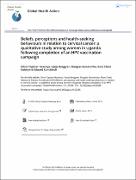| dc.contributor.author | Hasahya, Olivia Topister | |
| dc.contributor.author | Berggren, Vanja | |
| dc.contributor.author | Sematimba, Douglas | |
| dc.contributor.author | Nabirye, Rose Chalo | |
| dc.contributor.author | Kumakech, Edward | |
| dc.date.accessioned | 2020-11-10T09:43:37Z | |
| dc.date.available | 2020-11-10T09:43:37Z | |
| dc.date.issued | 2016 | |
| dc.identifier.citation | Olivia Topister Hasahya, Vanja Berggren, Douglas Sematimba, Rose Chalo Nabirye & Edward Kumakech (2016) Beliefs, perceptions and health-seeking behaviours in relation to cervical cancer: a qualitative study among women in Uganda following completion of an HPV vaccination campaign, Global Health Action, 9:1, 29336, DOI: 10.3402/gha.v9.29336 | en_US |
| dc.identifier.uri | https://hdl.handle.net/123456789/184 | |
| dc.description.abstract | Background: Cervical cancer remains a leading cause of morbidity and mortality in Uganda. Despite earlier
information campaigns to introduce human papilloma virus (HPV) vaccination, which also targeted cervical
cancer, misinterpretation and misunderstanding of the subject remain high. Women in Uganda present with
cervical cancer at an advanced stage due to poor health-seeking behaviours, with an associated high mortality
rate. This project explored beliefs, attitudes, perceptions, and health-seeking behaviours in relation to cervical
cancer among women in Uganda after an HPV vaccination project had been rolled out.
Design: A qualitative study design was used, with six focus group discussions (FGDs) that included 36
women, aged 25 49 years, with no previous history of cervical cancer symptoms or diagnosis. The women
were interviewed in February and March 2013. The transcribed data was analysed using content analysis.
Results: Three themes emerged: feeling unprotected and unsafe, misbelief and wondering about cervical
cancer, and fear of the testing procedure. Participating women had heard of cervical cancer but preferred to
wait to access cervical cancer screening until symptom debut.
Conclusions: There are still barriers to cervical cancer screening among women in Uganda, where there is
a need for culture-specific, sensitive information and interventions to address the issues of improving the
cervical cancer screening uptake among these women. Societal context needs to be taken into account when
implementing community-based health education. | en_US |
| dc.language.iso | en | en_US |
| dc.publisher | Global Health Action | en_US |
| dc.subject | beliefs | en_US |
| dc.subject | perceptions | en_US |
| dc.subject | health-seeking behaviours | en_US |
| dc.subject | health belief model | en_US |
| dc.subject | cervical cancer screening | en_US |
| dc.title | Beliefs, perceptions and health-seeking behaviours in relation to cervical cancer: a qualitative study among women in Uganda following completion of an HPV vaccination campaign | en_US |
| dc.type | Article | en_US |

